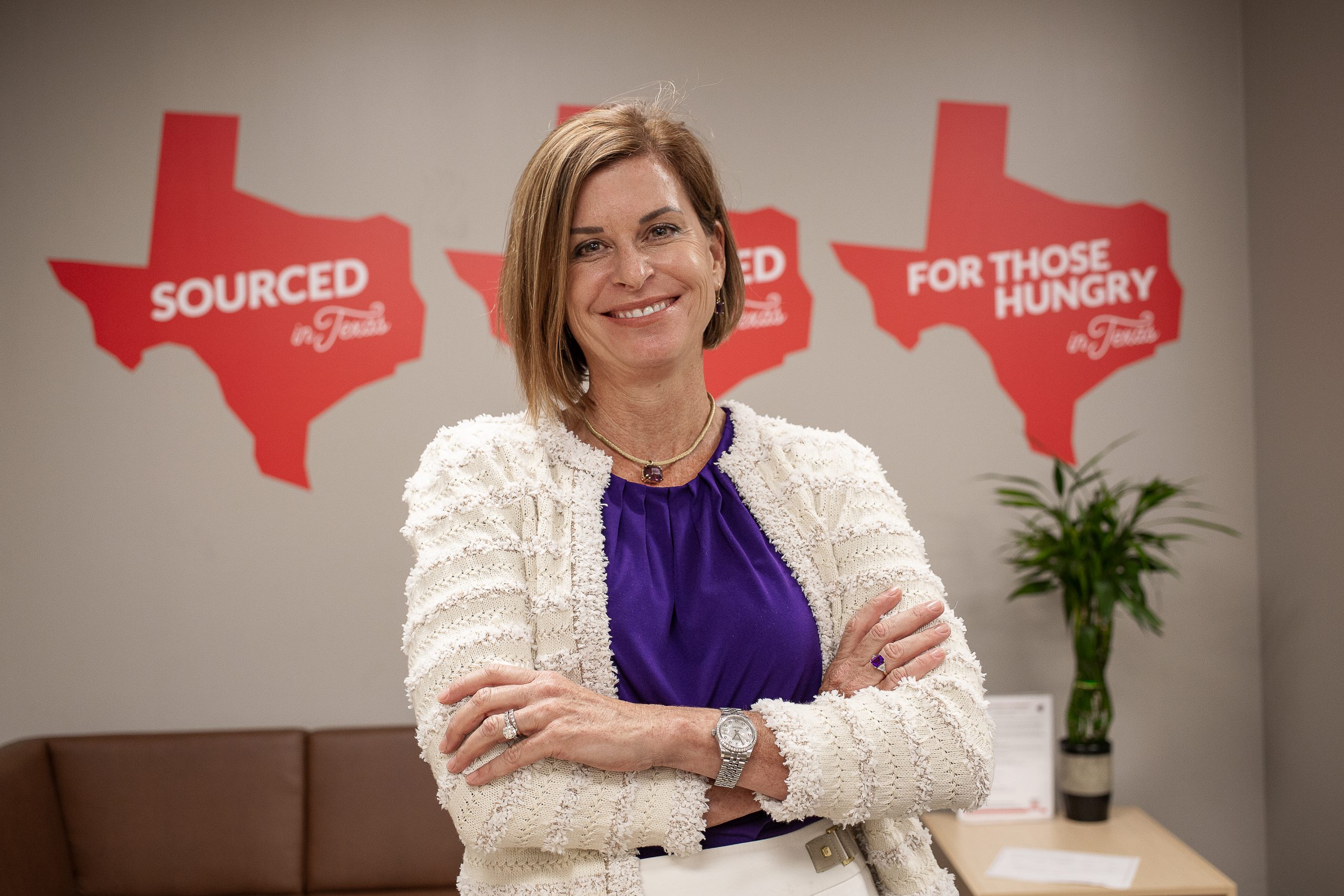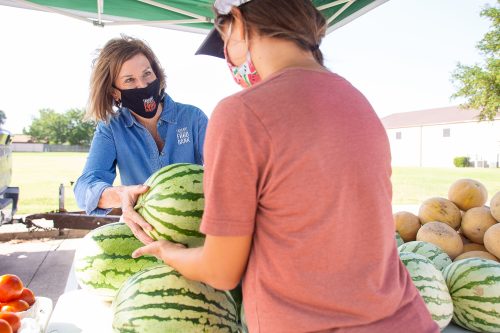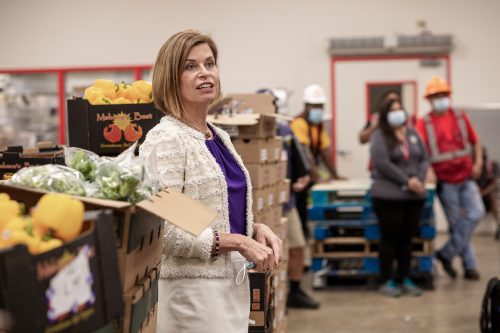Food Bank Director Leads During Pandemic
Julie Butner adapts to lead the Tarrant Area Food Bank during its hour of greatest need.

Julie Butner worked to feed the hungry during the coronavirus pandemic. Photo by Mark Graham
Food Bank Director Leads During Pandemic
Julie Butner adapts to lead the Tarrant Area Food Bank during its hour of greatest need.
A few months after the Tarrant Area Food Bank hired Julie Butner ’88 as its CEO and president, Covid-19 came to town and changed everything.
Prior to the pandemic, the food bank — through its 330 pantries and distribution programs — was providing 600,000 meals a week to people in 13 North Texas counties. That charge catapulted to 1 million meals per week during the pandemic.
“Our best guess is that about 40 percent of the people we’re seeing today have never ever had to use our services before,” said Butner, a registered and licensed dietitian. “They’re humiliated that they’re having to ask for food.”
But the 20,000 volunteers Butner relied on each month were off the table because of the coronavirus shelter-in-place order. She started mission Mondays, when her staff of 100 pauses its usual work and goes to the distribution center to disassemble pallets of bulk food and repackage it for individual use. Butner hired 20 furloughed hospitality workers as contract employees. She also requested government aid, and Texas Gov. Greg Abbott approved the placement of three units of U.S. Air National Guard men and women.
Feeding 250,000 people a week requires quite a bit of food.

Julie Butner stepped up to the plate to lead the Tarrant Area Food Bank during a global crisis. Photo by Mark Graham
“People think of meals and they think, ‘Well, it’s a Happy Meal.’ That’s not what we’re doing,” Butner said. “We’re doing 25-pound emergency boxes with staples that people have in their pantries and can last a couple days.”
The Tarrant Area Food Bank receives food from the U.S. and Texas departments of agriculture and 170 manufacturers and grocery partners. Those partners are stepping up even more, Butner said, because they’ve recognized the double-digit unemployment rate and increased need for assistance.
Farmers who faced restricted global food exports related to Covid-19 transmission allocated more to food banks in the U.S.
“There are only 200 recognized food banks in the United States, and we’re one of them,” Butner said. “We have had tremendous support from our community right here in Fort Worth.”
After a capital campaign four years ago, the food bank remodeled based on receiving and distributing 50 million pounds of food per year. Its current rate: 75 million pounds.
“Disruption creates a need for strong leadership, and responsive leaders who are not afraid to lead, to make quick decisions, to look for new opportunities and to adjust their business model as needed,” Butner said.
Butner is no stranger to leading during a crisis. She was a reserve officer working as a civilian dietician in support of a military hospital in Nuremberg, Germany, when the Gulf War broke out in 1990. The hospital served as an evacuation stop between Iraq and the U.S. to stabilize and triage wounded soldiers.
The supervising lieutenant colonel was about to retire, and she asked Butner to activate and serve as her right hand — even though she was only a second lieutenant.
Butner’s unit turned the 100-bed hospital into 1,000 beds for injured military.

Julie Butner readily faced the challenge of feeding North Texas despite holding her current position at the Tarrant Area Food Bank for single-digit months. Photo by Mark Graham
On 9/11, Butner was a vice president for LSG Sky Chefs in Irving, Texas. To accommodate the federal government’s new requirements for companies supporting the airline industry, Butner stepped into the airline caterer’s special task force. Her team created a security unit to transport catering vehicles and trolleys on and off airport property in a safe and secure way.
No stranger to crisis management, Butner readily faced the challenge of feeding North Texas despite holding her current position at the Tarrant Area Food Bank for single-digit months.
“The COVID-19 pandemic has created a crisis environment, and crisis creates disruption. We have seen disruption in every industry, from restaurants to retail to logistics to travel,” she said. “When all of this happened, I did not feel overly burdened by it. I just thought, this is another crisis and we have to sit down and logically plan through what we need to do differently.
“I don’t think anyone would dispute that now, more than ever, leaders need to step up and show others the way,” Butner said. “The silver lining of a crisis is that it allows leaders to shine. Under pressure, under stress, leaders emerge.”
Butner shared 7 characteristics to embody during a crisis: the acronym LEADERS.
L is for Leaderself: Great leaders understand that they need to look after themselves first before they can look after others. It’s the classic case of putting on your oxygen mask before helping others. This means indulging in self-care: Protect your time and your time off, put the cellphone down, meditate, exercise, eat and sleep well. You must put yourself first to have the energy to motivate and support others.
E is for Engaging: Leaders understand that you must engage others. Spend time with your team, customers or, in my case, donors and other stakeholders. You can’t overcommunicate in a crisis.
A is for Adaptable: Adaptability is a key attribute of any successful leader and especially so in a crisis. It is important to recognize that disruption can generate new ways of doing things. When you pivot resources to solve a challenge and adapt to change, it demonstrates your ability to adjust, to explore new ways and to see the bigger picture.
D is for Decisive: Great leaders are decisive; they make the difficult decisions when others won’t. Own the leadership, even when it’s challenging. This often involves tough calls and sometimes asking people to do things they are not accustomed to doing, or even want to do, but what is necessary for the good of the whole or the good of the organization. Recognize that there is a cost to inaction — it will never be perfect. Don’t be afraid to take action.
E is for Empathetic: Empathy is the ability to put yourself in someone else’s shoes. Great leaders know not everyone sees things the same way. Taking the time to really connect with team members to understand their concerns and explain the “why” behind the decisions you are making demonstrates that you are a caring leader.
R is for Resilience: Mental toughness, being able to bounce back, being positive and encouraging others will motivate your team to stay focused and on track, despite the change that is happening around them.
S is for Solution-Focused: One of the great things to come out of a crisis is an opportunity to do better, to do more. Many of us have had to change our business model virtually overnight. No one doubts that this pandemic will transform businesses and lives. It can also transform and redirect your career. Female leaders are uniquely communicative, have strong relationship abilities and take a team approach to problem solving — all essential attributes, especially in times of crisis. Now is the time to get out of your lane, be respectful, listen and give your opinion. Take an opportunistic approach to this crisis. Great leaders will enable their organizations to see the new way, perhaps a better way, and will endure the long run.
Edited for clarity and length.

Your comments are welcome
2 Comments
Thank you. What an honor.
Related reading:
Features
Forging a New Supply Chain
Covid causes companies to adapt to supply and demand swings.
Features
Food Justice Class Shines Light on Hunger, Nutrition
Community gardening, interviews and delivering nourishment to food deserts are all part of the curriculum.
Elementary Tries to Solve Food Insecurity Issue
Through a partnership with TCU, one Fort Worth school started a food sharing initiative.